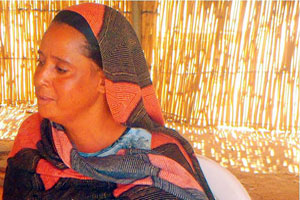
Matala Wallete with her red djellaba is well known in the camp.
Since February last year, thousands of Tuaregs have crossed the border from Mali to Burkina Faso to settle in makeshift camps, such as Mentao, 300 km north of the capital, Ouagadougou.
Matala Wallete with her red djellaba is well known in the camp. Like other women who arrived in the camps to flee the conflict in Mali, Burkina is synonymous with peace: “Since we arrived at the border of Burkina Faso, we feel safe, and so far everything is going well. The local authorities and the local population received us kindly. We are at peace with them.”
It is the same for Aisha, 20-year-old a young Tuareg. She is still moved by the hospitality she received since her arrival. “At the border even the police welcomed us,” she said.
For Ag Alassane Ali, 19 who arrived at the Mentao Camp a year ago, his feelings are mixed: “We are safe now but the problem for us young people is that we do nothing here. We spend our days drinking tea, listening to the radio and going from one tree to look for a bit of shade…in the camp, there is no entertainment except when NGO’s workers bring games, such as scrabble and draught, but they don’t leave the games with us when they go”
There is unfortunately a far more serious concern for this young man. Ali was in twelfth grade and planned to train as a civil engineering.
“I’m concerned about my future. I should have matriculated a year ago, but I have not been in a classroom for over 12 months. Now all seems lost,” he said. “I don’t see the situation changing so soon in Mali, so I won’t be going back, he said. “There is no college or high school in the camp. To continue my education I would need to go to Ouagadougou, which is financially impossible for my family”.
Matala Wallete said, “Our main problem is that we fail to find income generating activities. The other is we need to ensure some education of our children as there is only one elementary school in the camp opened by humanitarian agencies”.
She works with women as a volunteer for Caritas Burkina, training them on how to save energy.
“We appreciate all the help and support we get, especially concerning domestic energy,” She said. “It’s really thanks to Caritas Burkina that we discovered [energy efficent] stoves. We say thank you for that, and for your support.”
